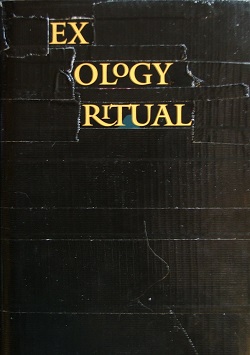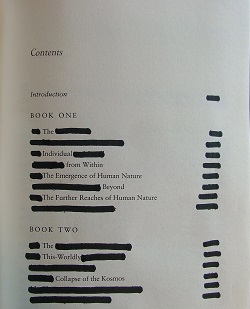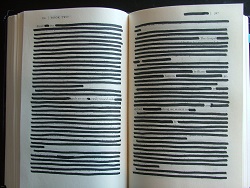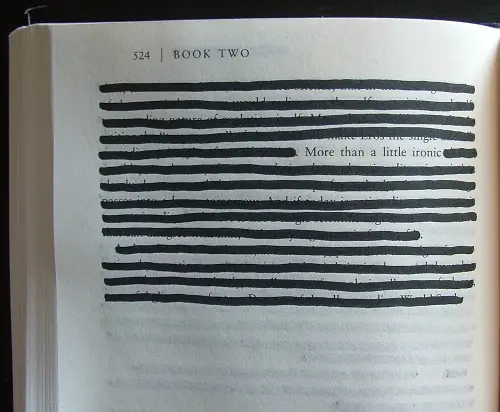|
TRANSLATE THIS ARTICLE
Integral World: Exploring Theories of Everything
An independent forum for a critical discussion of the integral philosophy of Ken Wilber
 Scott F. Parker is a writer and editor whose books include Coffee—Philosophy for Everyone: Grounds for Debate and Running After Prefontaine: A Memoir. He has contributed chapters to Ultimate Lost and Philosophy, Football and Philosophy, Alice in Wonderland and Philosophy, Golf and Philosophy, and iPod and Philosophy. He is a regular contributor to Rain Taxi Review of Books. His writing has also appeared in Philosophy Now, Sport Literate, Fiction Writers Review, Epiphany, The Ink-Filled Page, and Oregon Humanities. In 2010 he published the print edition of Jeff Meyerhoff's Bald Ambition: A Critique of Ken Wilber's Theory of Everything. For more information, visit http://scottfparker.blogspot.com. Scott F. Parker is a writer and editor whose books include Coffee—Philosophy for Everyone: Grounds for Debate and Running After Prefontaine: A Memoir. He has contributed chapters to Ultimate Lost and Philosophy, Football and Philosophy, Alice in Wonderland and Philosophy, Golf and Philosophy, and iPod and Philosophy. He is a regular contributor to Rain Taxi Review of Books. His writing has also appeared in Philosophy Now, Sport Literate, Fiction Writers Review, Epiphany, The Ink-Filled Page, and Oregon Humanities. In 2010 he published the print edition of Jeff Meyerhoff's Bald Ambition: A Critique of Ken Wilber's Theory of Everything. For more information, visit http://scottfparker.blogspot.com.
EX OLOGY RITUALBOOK TWO: The This-Worldly Collapse of the KosmosScott ParkerAuthor's Note
Since breaking with the integral movement ten years ago, I have followed Ken Wilber's career from a distance. It has been a curious show. I have seen branding largely supplant what's left of the intellectual project. I have seen Wilber become increasingly self-indulgent in his public statements. I have, I believe, witnessed the trappings of ideology. And, more than anything, I have felt quite fortunate to have gotten out when I did. When I was an undergraduate it was a different story. For reasons I once found unjust but now consider entirely reasonable, Wilber was unknown at my university. Nevertheless, I insisted on writing my honors thesis on Sex, Ecology, Spirituality. Needless to say, theories of everything were not held in high regard in the philosophy department at the time. But my advisors generously supported me as I pursued this interest. I've written here previously about the disenchantment with Wilber that developed for me over the following few years. During that time and subsequent decade, I never looked back at SES. But this winter I took it off the shelf and, with a marker in hand, set about looking for a different story within. Erasure is the poetic practice of transforming a found text into an original work by erasing (or, frequently, blacking out) the source text. I wanted to do an erasure of SES as a way of digging further into my intellectual past. There's no overstating the degree to which SES shaped my thinking when I was younger. I wondered if I could, in a way, unlock the book from within, using its own language to represent my reading of it and my ongoing relationship with this history. Some readers may consider this erasure a hostile act. I hope they don't. The intellectual life is one of constantly reading the past in order to write a new future. In concretizing that process, ex ology ritual is my tribute to this life.
I had no trouble in the move to the West. The source the summit the philosopher was to be found in the world. But forthwith the manifestation appears like a bubble. On the ground there is confusion as to the path as a means of vision realizing self-identity. I put karma yoga to the Good Will of these ideas, and for nothing. In short, we are waiting and we have belief. Thus, the circle is our identity. That is, we embrace ourselves. How can it be so imperfect? The integral life would fracture to pieces. 
A bitter acrimony is on the ascent. But I do not have it in awareness yet. In fact, for now I have no expectation that my worldview is suspicious. Any outspoken person was condemned and seen as a heretic who must be punished. The great philosopher pinned them to the ground. Individuals who shared the faith would sit forever in enlightenment. It was crucial the fury with which this myth would grow in the collective. The nature of the author is compassion but clearly we see the flowering of an idea that cannot, under any circumstances, be doubted. You will find that certainty is never, and can never be, actually doubted. If you doubt it means you know it but won't admit it. This is not something that needs to be proven. In regard to ultimate Reality and human love, is there no way to be both? I feel the dissociation. I am tempted to say everything is not absolutely harmonized. Shadow is the Ascended God. Suddenly, order dominance is integral and necessary. Put bluntly, we are people who understand and we judge them for not being us. This realization came as a great delight. I did not share this view of levels of integral perfection. Far from the final account and true raison, creative passion was bursting forth. We are still living in the manifest world, I believe. The Enlightenment mentality, with its metaphysical paradigm, continued a long line of monological systems theory even as the organizing principles were understood to be a deeper rationality. This Enlightenment is a narrative of systems harmony situated literally everywhere, with the result of the “perfection of the great Universal System.” But the world it can imagine as a possible future is always already included in the picture. In other words, the most universal is to an odd extent private. And the conclusion does not fit the normative rhetoric. There is no universal perspectivism vis-a-vis perspectivism. And my point is that it was a problem to suppress it in the first place. The proposition need be differentiated from the “Enlightenment.” I would like to point in particular to this language (my subjective wishes do not constitute reality or its scientific study). I am telling the truth if I am being sincere about how I feel if I am being truthful about expressing my inner state if I am reporting my depth sincerely. And that, indeed, is what might be called the central problem of postmodernity. I have been of theory of truth of self a “Nietzschean,” and, in a surprise move I would like to emphasize that subjectivity is at this point the thesis of tomorrow. And for Nietzsche a prerational, mythic God was a precious baby. The problem was how to deal with subsequent civilization. Recall that gods are not easily tossed aside. The Gospel is brilliant famous genius in any spiritual thing we want it to be. Or those who took the myths literally possess faith, the Logos literal myth in the philosophical creed. The upshot of this is that great philosopher-sages who have transcended both myth and reason take proper place in attunement with the Kosmos. It is common knowledge that the “laws of God” express themselves in the splendid achievements of educated men. In fact, a theory is evidence already assumed to be the case. But by far the most certain agenda was progress as advertised links in the chain toward completion of the plan. One harmonious system was the temperament of an individual in sole residence of Harmony. Salvation demanded that Each identify with the One. It quite obviously had nothing to do with religion, only Being expressed in profound truths. And to oppose is therefore the raison d'etre of a not-fully awakened awareness. I had a critic become.

In time, for reasons I tried to suggest in the last two chapters, the rational structure threw itself over for me to the originator of the system itself. The philosophical postulates became a guise for the needs of the ego. With the collapse of the Kosmos into the merely subjective, I was increasingly left to measure the former self, the one that could not account for the “view from nowhere.” I want to mention the map that creates territories and left a trail to follow: the map wasn't simply wrong. Just very instrumental. In other words, a harmonious whole was a shopworn religion. A happiness of order. One that would allow me to take my rightful place in the great instrumental whole, in contemplation of the timeless. The monological gaze an attempt to ameliorate the broken age of God. The massive rift between nature and will erased the very terms it was supposed to explain. And thus the central problem of modernity: human subjectivity and its relation to the world, continued. The battle is still with us today between Ego and Eco. But the solution is not to await integration. I am as prejudice as my opposition in making claims to the authority of the claim itself. That is the definition of ideology: hidden interests, hidden power claims, parading as truth, validity determined by power. I must fight my own inclinations, my own desires, my own natural impulses, to the extent that they aim at pure true rationality. I am not free when I am a slave to my desires, as truth finally is. Apart from the unambiguously objective epistemology, things possess meaning only by virtue of meaning. Thereby, philosophy attempted to gaze inward upon itself. The bad news continues in Nietzsche, Foucault, Derrida for those of us who believe language can reflect reality—and for this poetry most ideally suited. The idea wasn't to stand back and impartially and disinterestedly reflect on nature; the idea was to participate with nature and express nature, to join in the great currents of communion that nourish each and all, and not merely glorify one's own self-generated, self-independent agency. What is desirable in itself is not therefore so. The Ego answers, that is, to the Ego. Way Back, though, poetry enfolded truth through creation that reason cannot discern. And so in search of a pristine harmony with nature, I found the failure of integration, irrevocably. It is time now that I respond to this monologue. The paradox of the overthrow is the positive mania of common humanity that was a central project of the rebellion. I was for the work sympathetic. Thus the deeply personal poem would announce itself as a spiritual transformation. One approached in time. I am flooded by feelings released in my self. I am the receptacle of feelings coming into me. The dialogical nature of self bestows new glory on self-transcendence. Under these circumstances, the paradox is its own freedom. I have a simple take on the whole situation: In general, the layered onion of the self is afloat on the surface of the ocean. But the surface is supreme. And ultimate reality can “go too far.” Put differently, the nature of progress is evolution and it is human nature to know evolution as progress. And here we have our old story, aspiration transcending the world, obsessed with integration. Notice the human human human integration privileging I I Sovereign I. Unfortunately, the system was so massive and so coherent that when it began to unravel, which it did, it rather totally collapsed. As with Hegel, the new synthesis posited itself pure Spirit. This is a truly stunning vision. The genius usually referred to a philosopher born expressly for me, as the metaphysician was. Indeed, man changes and philosophy leads forward with modesty to another Not-yet. Homo universalis, I believe in us and the new work to be done. Emptiness is Form. I embrace culture and process. The question is the Self or consciousness and infinity. This is a note to the incomplete to say keep going, the debt is never settled. And self-contradiction only unending. And there is more. If I am to summarize the poem says thought cannot grasp infinity, and this is fine. Idea can be Cave, rationality projection, human beings reaching common omission. No idea can hold the world. Thus, everything is a myth so bizarre. The environment is, as we have seen repeatedly, not simply of instrumental value. My point, then, is be graceful with every chosen ideology. Indeed, all of this, God, Godless, the Kosmos, the I-I, the All is a little ironic. More than a little ironic.  |